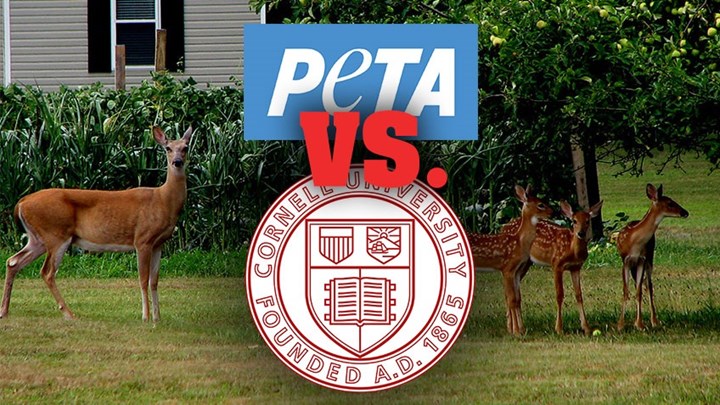
by Brian McCombie - Thursday, October 25, 2018

Apparently, the frantic folks at People for the Ethical Treatment of Animals (PETA) just can’t help themselves. When PETA sees a hunt, PETA sees red and must try to get said hunt stopped. Even when the hunt is needed to safeguard public health.
Case in point: PETA’s recent attempts to end a deer archery hunt in the Sapsucker Woods Sanctuary, a 220-acre swath owned by Cornell University in Ithaca, New York. Sapsucker Woods is home to the Cornell Lab of Ornithology, a research facility with a stated mission to conserve the biological diversity of wildlife through research and education.
According to the Cornell Sun, “a recent uptick in the deer population has jeopardized the health of the Sapsucker Woods, causing a decrease in populations of native plants, increased growth of invasive species and higher rates of Lyme disease in the area. As a result, Cornell has taken steps to proactively curtail the growth of the deer population in the forest, including regulated bow hunting.”
Not good enough for PETA, which launched an online campaign to end the hunt, and supposedly gathered 90,000 e-signatures for a related petition.
On its website, PETA claimed that archery deer hunting results in wounding over 50 percent of the deer hunted. It also argued that “hunting doesn't decrease populations—it creates a spike in the food supply, which increases breeding among survivors and attracts newcomers. The result is an endless killing cycle that destroys deer families.”
Beyond the obvious emotional and inaccurate uses of language (“deer families?”), PETA offered absolutely no proof for either the wounding rate cited or the claim that hunting can’t reduce wildlife populations. That is because its claims are false.
What is verifiable, though, is that Tompkins County, home to the Sapsucker Woods, is a hotspot for Lyme disease.
According to TickCheck.com, a university-affiliated lab based in East Stroudsburg, Pa., the Centers for Disease Control (CDC) recorded 519 confirmed Lyme disease cases among Tompkins County residents between 2000 and 2016.
However, TickCheck.com added, “Due to the fact that the CDC's data only represents confirmed cases, the actual quantity of Lyme disease cases may be far greater. We estimate a total of 5,190 true cases of Lyme disease in Tompkins County.”
Writing in the Ithaca Journal in August 2016, Douglas MacQueen, M.D., an infectious disease specialist on the staff of the Cayuga Medical Center, noted, “The incidence of Lyme disease can be expected to continue ramping up in Tompkins and surrounding counties ... The New York State Department of Health reports about 100,000 cases of Lyme [statewide] since the disease was first reported in 1986. About 3,736 new cases were recorded in 2014 … Tompkins and Schuyler counties were the Lyme hot spots in the Finger Lakes area …”
Concerns about the increasing presence of Lyme disease in the Sapsucker Woods Sanctuary was among the prime reasons Cornell officials decided upon a bow hunt, as deer are carriers of the deer tick which spreads this potentially devastating disease.
As the Cornell Sun reported, “Cornell responded to PETA’s concerns in an email dated Oct. 1 sent to the president of the organization from Joel M. Malina, vice president of university relations. In the email, Malina explained that Cornell’s deer population management program utilizes a variety of population control methods in addition to deer hunting … The school maintains that actions taken under their program, including bow hunting, are necessary in order to help preserve the health of the forest, to allow teaching and research using the forest’s resources and to reduce risks to human health and safety on campus.”
PETA’s reaction: “PETA does not feel satisfied by the response and hopes that by demonstrating public support for its cause through the petition, it can convince the school to overturn their deer hunting policy,” the Sun noted.
Translation: To PETA, deer are more important than people.
Editor’s Note: As previously reported on NRAHLF.org, Lyme disease can be serious with approximately 22,000 cases detected each year. For information on the precautions to take to help you avoid contracting it, please see contributor Ron Spomer’s NRAHLF.org article “’Tis the Season: Take Precautions against Lyme Disease.” Those of us who live much of our lives outdoors are at a greater risk of infection. On a personal note, I contracted the disease as did my father, who passed away from a heart attack that was, in part, due to complications from the disease.
As author Brian McCombie concluded, animal rights extremist groups such as PETA continue to put animals before humans, striving not just to ban all hunting but to diminish humanity itself. Fortunately, American hunter-conservationists remain focused on protecting wildlife and advocating for the humane, science-based management of all animals.
E-mail your comments/questions about this site to:
[email protected]
Proudly supported by The NRA Foundation and Friends of NRA fundraising.
